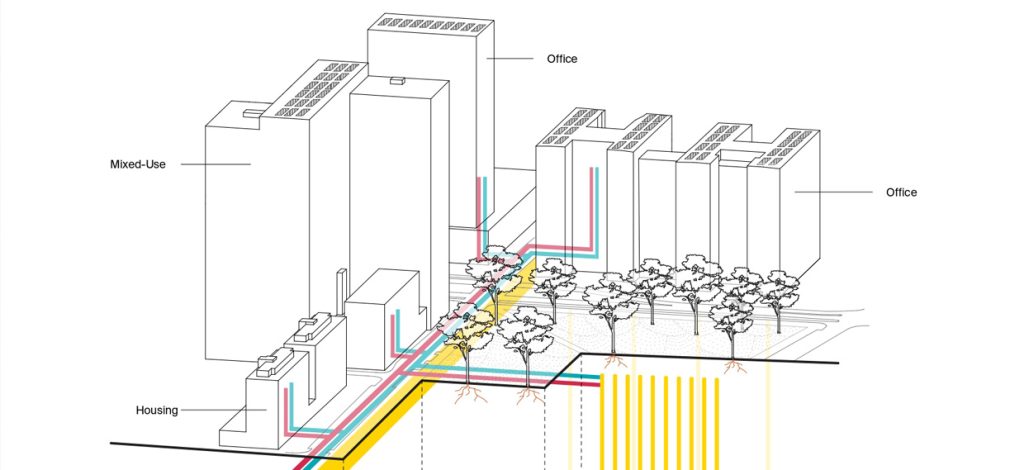Be.Share: ushering in the energy transition with an innovative heat exchange project
Under the Be.Share project, a heat network will be rolled out in the Nord district of the Brussels-Capital Region by mid-2028, as part of a gradual fossil fuel phase-out.
Be.Share, which focuses on accelerating the energy and technological transition, was the only Belgian project to be selected in the Third Call for Proposals of the European Urban Initiative (EUI). The project was initiated by Brussels Environment in partnership with the intermunicipal companies Sibelga and Vivaqua, privately-held company Karno, the Vrije Universiteit Brussel (VUB) and the non-profit organisation Convivence. Be.Share has been awarded a grant of around €5 million from the European Union.
Warming up to collective efficiency
The Be.Share project is part of the Brussels-Capital Region’s decarbonisation strategy, using advanced technologies that are still very rare in Europe. For now, the project aims to set up a low-carbon heat network to supply heat to different types of buildings (office buildings and private and social housing) in the North district of Brussels.
The one-kilometre-long heat network will facilitate heat exchange between buildings with complementary energy needs, based on a double loop network (20°C and 10°C).
A public-private partnership
The Be.Share network, which was initiated by Brussels Environment, is being developed in collaboration with the intermunicipal company Sibelga and the privately held company Karno. Both companies play a key role in the integration of thermal infrastructure into the Brussels energy network.
The system will use local renewable energy sources, i.e., geothermal heat (recovery of heat under public spaces) and a riothermal system (recovery of heat from sewage) that draws on the expertise of the intermunicipal company Vivaqua.
The scientific evaluation of the system and its replicability will be conducted in partnership with the VUB (Vrije Universiteit Brussel), which has the academic expertise needed for the project’s long-term viability.
Moving towards energy solidarity
By connecting very different buildings within one and the same heat network, Be.Share creates a new dimension of energy solidarity.
The challenge was to find an answer to a complex question, namely ‘What is the most effective way to reduce CO₂ emissions on the neighbourhood level? ’ This degree of optimisation can never be achieved with individual solutions for each building, such as the installation of heat pumps. By encouraging heat exchange between buildings with different consumption profiles, the system facilitates more efficient collective management while taking social constraints into account.
A significant reduction in CO₂ emissions
The system will achieve a reduction in CO₂ emissions of around 1,500 tonnes a year, helping to combat climate change. This new generation of urban heat networks, which go entirely without fossil fuels, will also accelerate a gradual fossil fuel phase-out.
Co-financed by the European Union
Be.Share has been awarded a grant of €6,249,489 for the heat network’s development, of which €4,999,591 is directly financed by the EUI instrument. 3,800,000 has been earmarked for infrastructure investment.
If Be.Share meets all the preparatory conditions, operational roll-out of the network is scheduled to start in October 2025, with a go-live by mid-2028.
Involving citizens…
The collaboration with citizens, which is facilitated by the not-for-profit organisation Convivence and Brussels Environment, is another key aspect of the Be.SHARE project.
To make the energy transition accessible to all, 331 households in social housing will take part in the project from the outset. These Brussels residents will be made aware of the importance of greener, more sustainable energy, and will learn to adopt the most adequate behaviours and customs to optimise the new network’s energy gains.
… and other cities across Europe
Finally, the partners behind Be.Share have also set up a collaboration with three European Transfer Cities, which are monitoring the project’s evolution in order to adapt the model to their own urban contexts in the near future.



